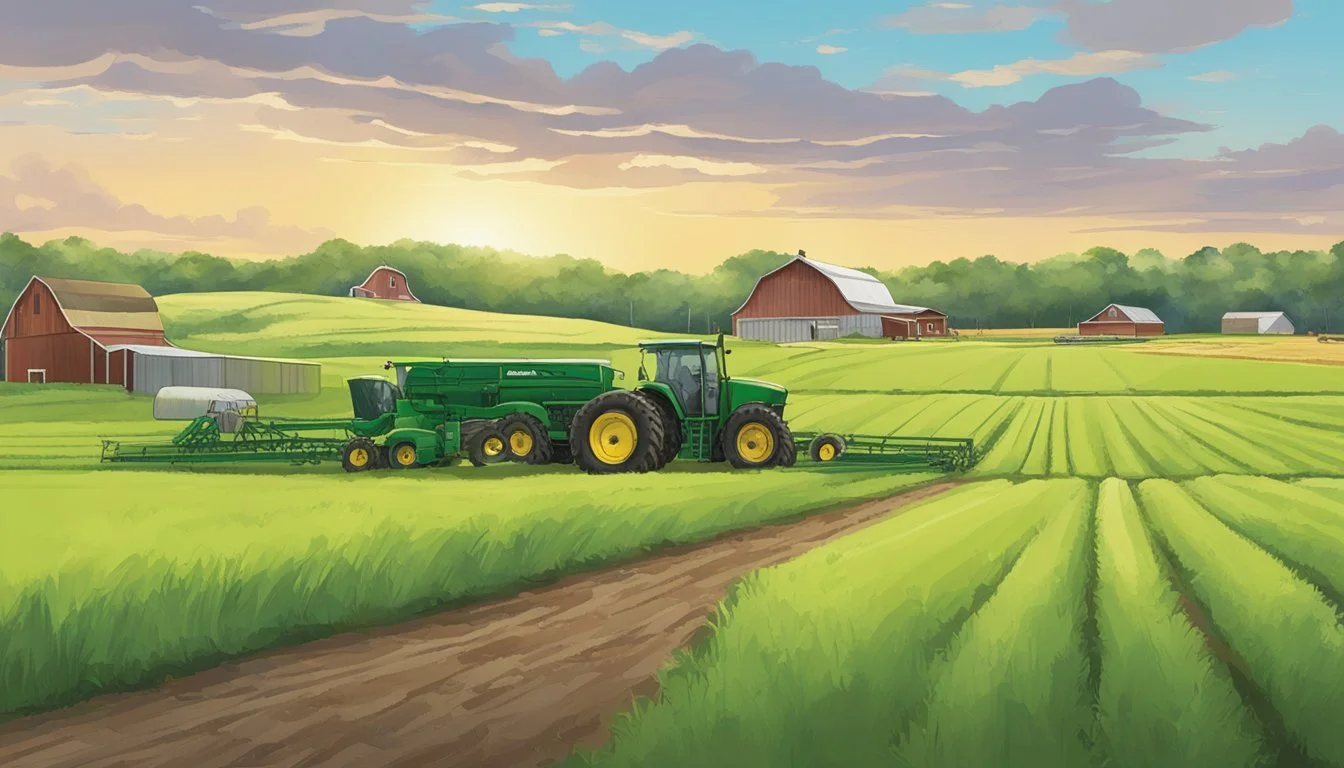Arkansas Farm Land for Lease
Opportunities and Options for Aspiring Farmers
This Article is Part of Our Guide on Navigating Agricultural Leases Across the US
Leasing farm land in Arkansas offers an opportunity for investors and farmers alike to capitalize on the state's diverse agricultural landscape. With its rich fertile soil, Arkansas boasts a variety of plots suitable for different types of farming, from crop production to livestock grazing. Interested parties have access to a range of sizes and locations, with land available in regions such as the Ozarks, the Delta, and the Timberlands. The flexible leasing options accommodate a spectrum of agricultural ventures, be it a small organic setup or a larger-scale commercial farm.
The local marketplace for Arkansas farm land for lease is vibrant and user-friendly, often providing potential lessees with tools to get notified about properties that meet their specific criteria. In areas like Washington and Pulaski County, for instance, one can find land with ample acreage and suitable amenities for various farming needs. Securing a lease in Arkansas can be a strategic move due to the state's favorable growing conditions and its reputation for agricultural productivity.
Understanding Arkansas Farm Land Leasing
In Arkansas, leasing agricultural land is a common practice that supports the state's robust farming industry. Understanding the types and factors affecting lease rates is crucial for both landowners and tenants.
Types of Farm Land for Lease
Arkansas offers various types of farm land for lease, each catering to different agricultural needs. The property can range from vast acres of crop land to smaller parcels suitable for specialty farming. The primary categories include:
Row Crop Land: Ideal for planting soybeans, (how long do soybeans last?) rice, and other row crops.
Pasture Land: Used primarily for grazing livestock.
Specialty Crop Land: Smaller plots for fruits, vegetables, or organic farming.
Leases may be structured differently depending on the type of farm land and the specific needs of the lessee (tenant) and lessor (landowner).
Factors Affecting Lease Rates
Lease rates for farm land in Arkansas are influenced by multiple factors, including:
Property Location: Proximity to markets and accessibility can affect lease rates. Counties with higher farming activity may command higher rents.
Land Quality: Fertility and topography play a role in determining the value of land for lease.
Lease Term: Longer lease agreements may impact the rate differently than short-term leases.
Market Demand: The current supply and demand in the marketplace for Arkansas agriculture property also dictate lease rates.
Factor Influence on Lease Rates Location Higher rates in farming-centric counties Acres (Size) Larger properties may have a lower rate per acre Soil Quality High-quality soil commands higher rates Market Rates (/ ac) Average market rates guide lease pricing Lease Flexibility Custom terms can affect lease rates
The average lease rate in Arkansas can also be indicative of the health of the agricultural market, although specific lease agreements may deviate from the average based on the factors listed above. Whether it's for a residential project, commercial farming, or any range between a few acres to hundreds, understanding these aspects helps in making informed leasing decisions.
Arkansas Agriculture Overview
In Arkansas, agriculture plays a vital role in the state's economy, with a diverse range of crops and commodities grown across various agricultural zones and counties. The state is well-known for its contributions to crop farms, pastureland, and timberland, as well as its recreational acres used for pursuits like duck (What wine goes well with duck?) hunting.
Crops and Commodities
Arkansas's agricultural output is varied, with rice being one of the leading commodities, placing the state as a top contributor in the nation. The state also produces significant yields of soybeans, corn, and cotton. Farm income in Arkansas is bolstered by other agricultural sectors including livestock, poultry, and forestry products.
Rice: The primary crop, key to the state’s agricultural sector.
Soybeans & Corn: Essential crops that follow rice in production volume.
Cotton: Historically significant and remains a valuable commodity.
Poultry and Livestock: Critical for diversified farm income.
Timberland: Arkansas’s forests contribute to both timber production and recreational uses.
Agricultural Zones and Counties
Arkansas is geographically diverse, with farming activities tailored to the state's distinct regions. The fertile Delta region, flanking the Mississippi River, is prime farmland known for its rice and soybean production. Further west, the Ozark Mountains provide suitable land for pasture, timberland, and recreational hunting.
Notable Agricultural Counties:
Stuttgart: Renowned for its rice production and branded as the rice capital of the world.
Arkansas County: Features extensive rice fields and is a hotspot for duck hunting.
Benton County: Located in the northwest, known for poultry and rich agricultural land.
Arkansas's agriculture thrives on a combination of fertile farmland, diverse crop production, and integrative use of land for food plots, hardwoods, and both commercial and recreational activities. Its counties each contribute uniquely to the state's reputation as a robust agricultural contributor.
Legal and Financial Considerations
When examining the legal and financial aspects of leasing farm land in Arkansas, one must take into account the enforceability of lease agreements and the implications of owner financing and potential foreclosures.
Lease Agreements and Contracts
In Arkansas, a lease for agricultural land that extends beyond one year must be in writing to be legally enforceable. This protects both the landowner and the tenant by providing clear terms such as the rental rate, duration, and rights and responsibilities of each party. Typically, the lease contract will detail specifics including the $ / ac max (maximum amount per acre), which ensures that tenants are aware of their financial obligations and landowners receive a fair value for their real estate.
Owner Financing and Foreclosures
Owner financing is an alternate route to traditional mortgage lending, where buyers may finance the purchase of land directly through the seller. It carries a certain appeal due to its accessibility, often with $ min (minimum down payment) being more flexible than with banks. However, the risk of foreclosure remains if the buyer fails to meet the financial terms of the agreement. During a foreclosure, the status of the land reverts to the seller if the buyer defaults, affecting both the real estate market and agricultural productivity.
Finding and Evaluating Land for Lease
When seeking to lease agricultural land in Arkansas, it's vital for prospective tenants to utilize dedicated land listing platforms and to carefully assess the land's quality and suitability for their specific agricultural needs.
Land Listing Platforms and Marketplaces
LandCashin is a marketplace where individuals can find crop farm land available for lease in Arkansas. Each listing provides a snapshot of available plots, often outlining unique features and acreage. Prospective tenants should leverage such marketplaces to review various properties and to compare the diverse options. Additionally, platforms like Land and Farm or Mossy Oak Properties Strawberry River Land and Homes offer a broad range of land property options that may cater to different leasing criteria. Users can also subscribe to Deal Alert programs, which notify them when new listings matching their specifications become available.
Key platforms to consider:
LandCashin
Land and Farm
Mossy Oak Properties Strawberry River Land and Homes
Features to look for:
Acreage
Type of land
Location
Suitability for intended use
Resources to utilize:
Deal Alert notifications
Marketplace filters
Assessing Land Quality and Suitability
Evaluating the quality of the land is critical before entering a lease agreement. Prospective lessees should inspect the soil composition, access to water resources, and the overall condition of the land. It's important to consider the land's history of use, as this can affect soil fertility and the presence of pests or diseases. The suitability of the land in terms of size, location, and infrastructure should align with the tenant’s operational needs and long-term goals.
Factors to assess:
Soil health
Water availability
Past usage
Accessibility
Importance of suitability:
Compatible with crop type
Supports agricultural practices
Meets business objectives
In the process of leasing farm land, a methodical approach to finding and evaluating land is indispensable for success.
Strategies for Leasing Farm Land
When entering the Arkansas farm land leasing market, it's critical for both the landowner and the tenant to have clear strategies to ensure a successful partnership. The first step is recognizing one’s agricultural needs and financial capacity, followed by the negotiation process to secure transparent and beneficial lease terms.
Determining Your Needs and Budget
A prospective lessee should assess the minimum acreage necessary to support their farming operations. The average size of a farm lease will vary based on the type of agriculture practiced, but a clear understanding of scale is crucial. They must consider the land's suitability for their intended crops or livestock and any additional space required for equipment or infrastructure. Budgeting is significant, as it shapes the lease's affordability. The budget must account for all operating expenses, including but not limited to seed, fertilizer, labor, and land payments.
Negotiating Leases and Securing Terms
Negotiation is a strategic phase where lessees and lessors agree on terms beneficial to both parties. Key factors in the lease contract may include:
Duration: The length of the lease impacts farming stability and investment returns.
Rent: Determination of a fair rental rate, whether a fixed amount, percentage of crop yield, or a combination.
Responsibilities: Clarity on who handles maintenance, improvements, and compliance with agricultural laws.
Renewal and Termination: Conditions under which the lease may be renewed or terminated.
By carefully negotiating these terms, lessees can secure a lease that aligns with their operational goals and ensures the sustainable use of the farm land.
Conservation and Sustainability
Arkansas offers a unique opportunity for land leasing that centers on conservation and sustainable farming practices, aiming to maintain viable agricultural lands while protecting natural resources.
Participation in Conservation Programs
Lessee farmers in Arkansas can partake in conservation programs such as the Agricultural Conservation Easement Program (ACEP) and the Wetlands Reserve Program (WRP). ACEP focuses on protecting farm and grassland, via Agricultural Land Easements, by limiting non-agricultural uses to secure a sustainable income for farmers who preserve their lands. WRP emphasizes restoring, enhancing, and protecting wetland ecosystems, often providing benefits such as improved water quality and wildlife habitat.
Implementing Sustainable Farm Practices
Farmers who lease land in Arkansas are encouraged to adopt sustainable farm practices. This includes optimizing water usage, implementing crop rotation to foster soil health, and employing integrated pest management (IPM) techniques to minimize chemical usage. Sustainable practices ensure that the farmland remains productive and environmentally sound for future generations. By focusing on sustainability, lessees contribute to the long-term viability of the agriculture sector and to the broader goals of land conservation networks in the state.
Additional Farm Land Amenities
When considering leasing farm land in Arkansas, potential lessees should take note of the various amenities that can enhance the agricultural value and the quality of life on the property.
Natural Features and Recreational Areas
Arkansas farm lands often come with distinctive natural features that provide both aesthetic value and functional benefits. One such feature is Kings River frontage, which offers abundant water resources and scenic views, making it an excellent spot for both irrigation and recreational activities. Many properties also boast quality pastures that lie amidst gently rolling hills, providing ideal conditions for cattle ranching and livestock grazing. It is not uncommon to find leased lands adjoining a national forest, offering incredible hunting opportunities and ultimate privacy. Furthermore, properties may feature massive springs and ponds that serve as vital water sources for farming needs.
Residential and Storage Structures
The presence of various structures on farm land can significantly contribute to its utility and comfort. A detached garage serves as a secure place for storing vehicles and farming equipment, while additional outbuildings offer space for tools and supplies. Farm lands may also possess garden spots, where lessees can cultivate a variety of crops or maintain an herb garden. Residential amenities are equally important; many farmsteads include a primary bedroom with a mountain view, allowing residents to appreciate the beauty of an Ozark Mountain ranch from the comfort of their home. Furthermore, properties that are fenced and cross-fenced enhance the security for both the dwellers and the livestock being raised on the land.
Wildlife and Hunting Opportunities
Arkansas offers an abundance of wildlife and diverse terrains that provide excellent hunting opportunities for enthusiasts. From river bottom lands hosting a variety of game species to the lush hay meadows and woodlands interspersed throughout the farmland, Arkansas stands out as a prime destination for hunters seeking quality game and experiences.
Hunting Land Features and Game Species
Arkansas's farmlands are known for their variety of environments that support an array of wildlife. The state is particularly noted for its deer population, providing a challenging pursuit for hunters. In addition to deer, these lands are home to turkey, hogs, and even black bear, fulfilling the needs of diverse hunting preferences.
River Bottom Land: Rich in biodiversity and frequented by various game.
Woodlands: Offer shelter and food for deer and other wildlife.
Hay Meadows: Open areas that attract game for food and can provide strategic hunting spots.
Balancing Agriculture and Wildlife Management
Agriculture plays a significant role in Arkansas's economy, and the relationship between farming activities and wildlife management is integral. Farmers often lease their land for hunting, thereby creating a mutually beneficial scenario.
Economic Benefits: Hunting leases provide additional income for farmers.
Habitat Management: Leased lands contribute to the conservation and management efforts for wildlife habitats, ensuring species like deer and turkey thrive alongside agricultural developments.
Farmers and conservationists often collaborate to maintain both productive farmlands and healthy wildlife populations, promoting ecological balance and sustaining Arkansas's reputation as a superior hunting destination.
Local Insights and Case Studies
In the context of Arkansas' fertile soils and diverse landscapes, leasing agricultural land has proven both profitable and innovative for various stakeholders.
Success Stories from Arkansas Land Leasers
Arkansas land leasers have seen measurable success by capitalizing on the state’s rich agricultural resources. Stone County has emerged as a notable area where lessees have developed profitable ventures. On a leased property, a traditional farmhouse and storage buildings were erected, harnessing the aesthetic appeal and utility, thus increasing the land's value. A custom home built on another leased parcel demonstrates the potential for personalization while upholding farming activities. Additionally, incorporating Clayton mobile homes on leased farm lands has provided affordable and flexible living solutions for workers, ensuring a robust and consistent labor force.
One lessee's strategic placement of a pond accompanied by a lean-to has not only enhanced the property's irrigation system but also led to increased land productivity. This adaptation showcases the ingenuity prevalent among Arkansas's farming community.
Case Studies: Optimal Use of Arkansas Farm Land
Case studies from Independence County and its county seat, Batesville, illustrate optimal use of leased farm land for both agricultural production and recreational activities like hunting. Lands with natural springs contribute to the sustainability of farming operations and enrich the biodiversity, thereby attracting lessees interested in conservation and outdoor activities. Properties in secluded locales offer privacy, key for tenants seeking an exclusive farming experience or for those who value the tranquil environment of rural Arkansas.
The LandCashin marketplace is an instrumental platform cited in these case studies, aiding potential lessees to find suitable crop farm land through a streamlined process. A feature known as the “deal alert program” notifies users about upcoming land leasing opportunities, a testament to the technological advancements supporting agricultural endeavors in Arkansas. This marketplace fosters a connection between landowners and lessees, ensuring the land is used to its full potential for crop production, livestock, or a combination of diversified farming practices.
Overall, these insights and case studies from Arkansas elucidate the dynamic nature of farm land leasing, reinforcing the importance of tailored strategies to yield optimal use.









